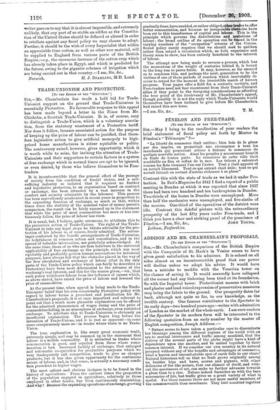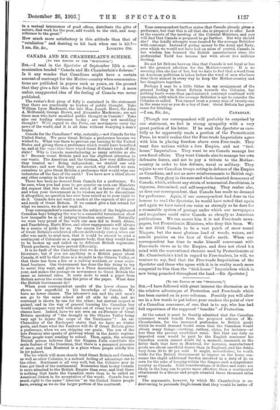ADDISON AND MR. CHAMBERLAIN'S PROPOSALS.
[To THE EDITOR OP THE " SPECTATOR.")
SIR,—Mr. Chamberlain's comparison of the British Empire with the Campanile of St. Mark's in Venice seems to have given great satisfaction to his admirers. It is echoed on all sides almost as an incontrovertible proof that our power will decline unless we adopt his advice. It would have been a mistake to meddle with the Venetian tower on the chance of saving it. It would assuredly have collapsed
all the sooner had any tinkering been tried at its foundation. So with the Imperial tower. Protectionist masons with brick
and plaster and loud-voiced expression of preservative measures may bring the fabric to the ground. Our prosperity dates far back, although not quite so far, to our knowledge, as the twelfth century. One famous contributor to the Spectator in its early days—two hundred years ago—writes with admiration of London as the market of the whole earth. I am sure readers of the Spectator in its modern form will be interested in the following quotation from an early number by the master of English composition, Joseph Addison :- " Nature seems to have taken a particular care to disseminate her blessings among the different regions of the world with an eye to mutual intercourse and traffic among mankind, that the natives of the several parts of the globe might have a kind of dependence upon one another, and be united together by their common interest. If we consider our own country in its natural prospect without any of the benefits and advantages of commerce, what a barren and uncomfortable spot of earth falls to our share! Natural historians tell us that no fruit grows originally among us, besides hips and haws, acorns and pignuts, with other delicacies of the like nature, that our climate of itself, and with- out the assistances of art, can make no farther advances towards a plum than to a sloe. Nature indeed furnishes us with the bare necessaries of life, but traffic gives us a great variety of what •is useful. For these reasons there are not more useful members of the commonwealth than merchants. They knit mankind together in a mutual intercourse of good offices, distribute the gifts of nature, find work for the poor, add wealth to the rich, and mag- nificence to the great."
How much more satisfactory is this attitude than that of "retaliation" and desiring to hit back when one is hit ?—







































 Previous page
Previous page